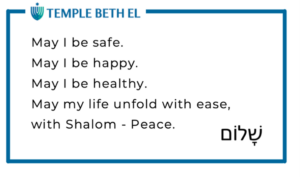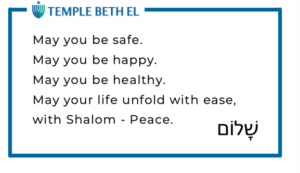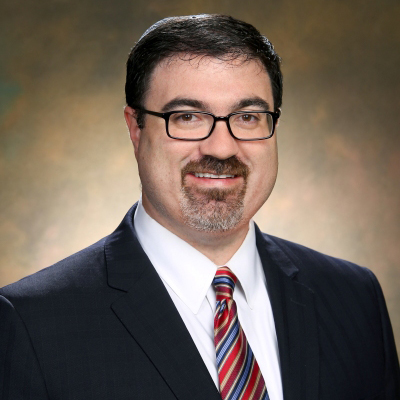This summer I traveled with my family to Alaska where glaciers form rivers that flow through mountains ranges covered with dark green boreal forests. My camera could neither capture the scale nor the magnificence. Late one night I sat on a chair outside thinking about the dynamics of the past few years. I looked up and to my bewilderment saw this rainbow.
I’ve never seen a rainbow at 11:00 PM. As light slowly rolled into semidarkness, I sat in a liminal space between day and night. The beautiful mix of bold and bright colors, mixed with the dark hues of blue-green and gray. In that moment, I thought of all that had led me to the Alaskan interior.
Our adventure was a twice-COVID-delayed celebration of my mother’s 75th Birthday. The journey to get there included two years of suffering and joy, parenting and professional challenges, loss of lives, illnesses and recovery, insecurity and quarantine, vaccines, and boosters. My family and I had finally made it – Shehechyanu Va’kiyamanu Va’higiaynu Lazman Hazeh. Thank God for sustaining us and helping us to reach joyous moments.
The sweetness was layered with complex feelings about everything we have all experienced. The multi-colored Alaskan scenery reminded me of a poignant moment that I had a few weeks prior when I drove my older son, Micah, to Camp Coleman. We called his grandparents so Micah could say goodbye on our drive to Cleveland, Georgia.
My father-in-law asked Micah how he felt about going to camp and Micah responded, saying that he felt “bittersweet.” He explained that he was excited to go to camp. He was also sad to be leaving his mom, his dad, and our family dog. And as much as he may not have wanted to admit it, his younger brother, too.
My father-in-law responded and beautifully said to Micah that the word “bittersweet” – can describe so much about life. Life is like the flourishing and fleeting rays of light melding and joining together, joy and sadness, pain and hope, into the complex beautiful landscape we call “life.”
The word “bittersweet” in Hebrew is Matok Mar – it’s the reverse. Matok, Sweet. Mar, Bitter. Sweet Bitter. There is wisdom in both the Hebrew and English. It’s like breaking the glass at a wedding. Our joyful celebrations are muted with our experience of brokenness. We celebrate even as we mourn a loved one whose chair sits empty.
Matok Mar – the sweetness of life is always mixed together with the painfully bitter world. Matok Mar – because all of us know – or will know – love and loss, joy and suffering. The bitter is often a catalyst for how we connect, how we can turn towards each other with compassion, turn our suffering into creativity and resilience, and our pain into meaning.
For those who saw my Facebook posts of our adventure and the selfies taken in front of the immense backdrops of nature, or the children dancing for joy on a glacier, the snapshots wouldn’t have adequately shown that pain lives alongside joy. That love lives with loss.
How inspiration lives alongside melancholy. No smiling selfie shows the complexity of our inner lives.
For me, leading our congregation through this time was trying. Parenting was a lesson in managing anxieties and mining the depths of my soul for patience. I experienced great loss – of close family members who died and whose memorial services I couldn’t attend.
The snippets of our life that we typically choose to share can distort the holistic picture of matok-mar, the bittersweet. We don’t always see the full color-palette of life, the darker hues of sadness that are interwoven with the light of joy.
Susan Cain argues in her book, Bittersweet, that western cultures downplay grief. We diminish loss and pain and our own roles in perpetuating it. We often pretend that the pain doesn’t exist. She argues that our lives are poorer for it because closing yourself off to sadness also shuts down the possibility of cultivating courage and empathy, kinship, and relationships, with people who could be caring for each other.[1]
That’s why we embrace the bittersweet. Because our ability to grow as people is profoundly connected to the ways in which we confront the very real pain in our midst. When we look away from the brokenness in our own lives, or the pain that surrounds us, we also have a disturbing way of ignoring or pretending not to see our own roles and responsibilities and the real ways we have contributed to or created or perpetuated suffering, too.
Yom Kippur asks us to think about how we will live with pain and brokenness in a way that will not break us or depress us, but rather give us direction, attention and intention to each and every day.[2]
I want to suggest – maybe because I am a rabbi – that we begin with a prayer. When I pray silently – whether in the morning – or in the silent Amidah – I recite a loving kindness prayer that I learned in a Jewish spirituality fellowship. It’s a mantra adapted from the Buddhist Metta tradition. I say:
And after I pray for myself, I pray for the members of my family for people I know and love.
And yes, I also even pray for those who have caused me pain.
Our prayers are like mirrors. To pray for my own wellbeing and the wellbeing of those I love and appreciate also helps me to approach people I sometimes struggle with more loving kindness and compassion, too.
Our prayers help us to discover a deeper sense of connection and help us to expand the circle of those we see as a part of ourselves. To recognize that there is more that unites us. And that the only way we will be able to survive through the world that is this broken and this painful by having a little more loving kindness and empathy with ourselves and towards each other, in this Brutal and Beautiful – Brutiful – life.[3]
A loving kindness prayer can help us to see, more clearly: The shopper at the grocery store who just broke out in tears, the elderly person who feels unsure and uncomfortable, the exasperated and exhausted parent who’s at the end of their rope, the colleague who is not performing up to anyone’s expectations – least of all their own, the college graduate who is struggling to find their way, the kid who is frustrated with their parents because they don’t feel seen, the person who feels like their values are under attack.
There are other ways in which we can cultivate more empathy, too. We develop more empathy by choosing to be curious – to ask questions before jumping to conclusions. To wonder, what’s going on with people before climbing up the ladders of inference.
It’s just so easy to see the worst in people – or to see the worst in community – to write people off. It’s just so easy to write a nasty post on social media or fire-off a scathing email or to be super judgmental about personal behaviors, or parenting choices, or shun people with opinions that are different from our own.
If we get curious about what other people may be experiencing in their lives, we may find that there is more that binds us than divides us. We may learn that our own pain is not in isolation – that people would be empathetic towards us because, literally everyone – everyone has lived with pain, too.
Valerie Kaur, teaches in her book See No Stranger, “When we are brave enough to sit with our pain, it deepens our ability to sit with the pain of others. It shows us how to love them. ”[4] Kaur also says, “You don’t need to know people in order to grieve with them. You can grieve with them, in order to know them.”
We aren’t the first generation of Jews who have lived in “Brutiful” times. Our ancestors taught us that in a world where we can’t control much, we can control how we welcome pain, how we extend love, in our prayers and acts of lovingkindness, and embrace the bittersweetness in each other’s lives.
The rabbis in the beautiful city of Sefat, in Israel, experienced brokenness with profound poverty was all around them. Rabbi Isaac Luria, who lived there taught a hopeful story that when God was creating the world, God breathed light into kaylim – into vessels. Unable to contain the brightness and the power of God’s light, the vessels broke sending klipot – the broken shards of the vessels into the Universe. Rabbi Luria explained that our world is filled with these klipot – these broken shards – and that each shard conceals an original spark of God’s light. Luria teaches us to look beyond what simply appears to be a shattered vessel and find within it a glimmer of the Divine.[5]
Our task is to ‘bend down, pick-up the fragments of light, to see that each person in this world contains a glimmer of the Divine. And in so doing to perceive that light can emerge from darkness. [6] We can cultivate empathy for ourselves and for others pray for love, and happiness, and wellbeing for ourselves and those we love. And then, with our actions, choose to love and embrace the sweet amongst the bitter.
Why? Because like trees reflected in an azure blue mountain lake, like the quiet goodness in the human soul or the infinite and iridescent promise of a new day the sacred and the miraculous are, indeed, everywhere. They are, literally, all over the place. They are in your soul And in the souls of the people who are sitting next to you. And the people we have yet to meet.
COVID has made us all trauma survivors. We can’t avoid the pain. But we can embrace how the bitter and the sad are forces of human potential. We can embrace matok-mar –the sweet and the bitter, with a listening ear, cultivating warm empathetic embrace and with a sense of curiosity about how we can lift the broken shards and lift God’s light of compassion for this next year.
May you be safe,
May you be happy
May you be healthy,
May your life in this New Year, unfold with ease,
with Shalom – Peace
Amen[7]
[1] Susan Cain, Bittersweet: How Sorrow and Longing Make Us Whole
[2] Rabbi Dara Frimmer
[3] Glennon Doyle
[4] Valerie Kaur, See No Stranger: A Memoir And Manifesto of Revolutionaryt Love.
[5] Howard Schwartz, Tree of Souls. Pg. 122. Note: The shards and the sparks are the ultimate expression of bitter and sweet, the literal broken pieces that each contain a glimmer of the Divine. We bear both and open ourselves to the sometimes-challenging reality that we contain multitudes. When we do that, we bear these realities of the world, by cultivating that empathy for ourselves and others.
[6] Susan Cain, Bittersweet pg 242
[7] Thank you to my son, Micah, and my father-in-law, Malcolm Bonnheim, for providing great conversation and a High Holy Day Sermon idea. Thank to my writing partner, Rabbi Dara Frimmer, and my gracious editors, Michele Lowe, Julia Bonnheim, and Rabbi Ana Bonnheim.







